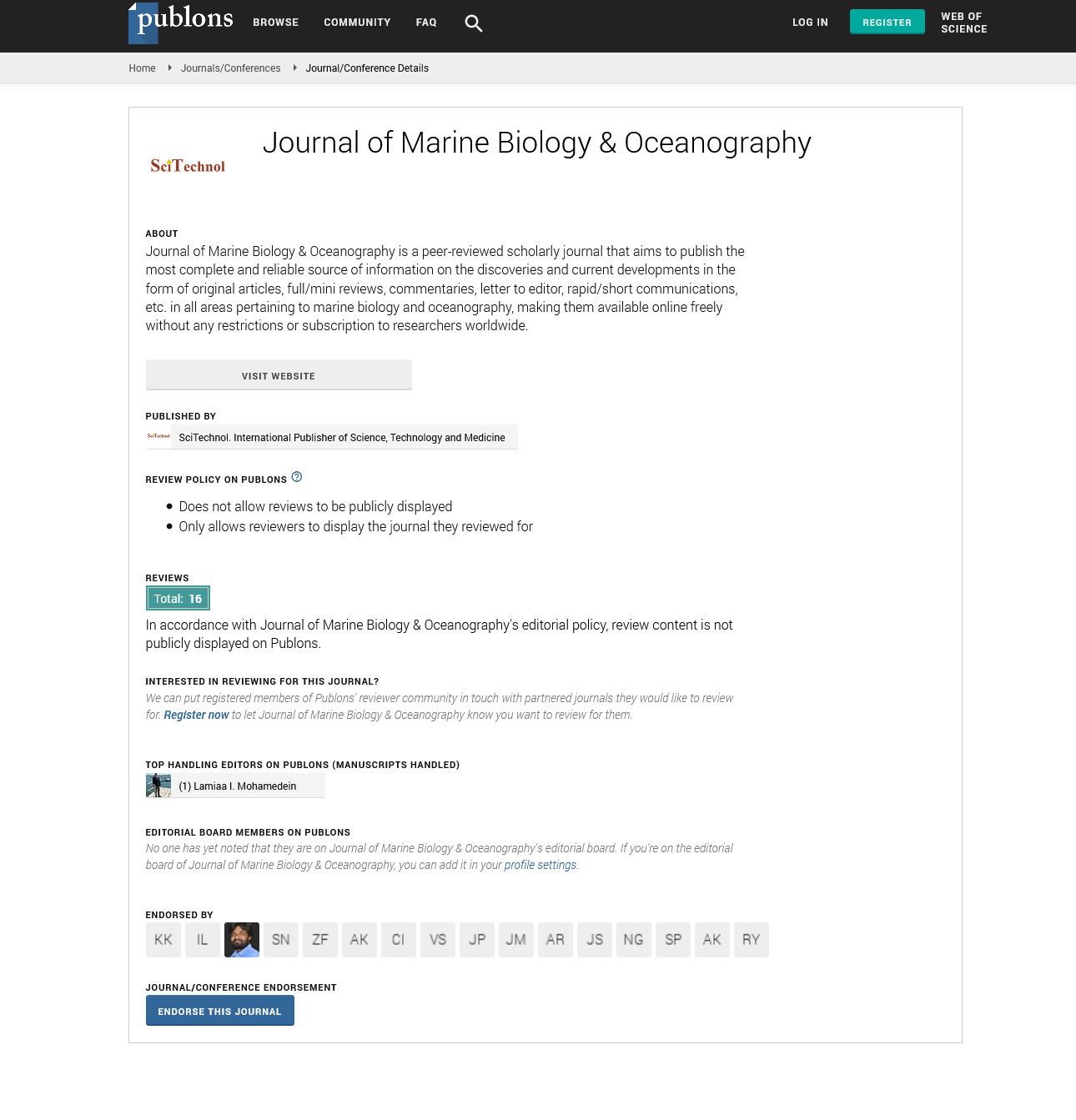Perspective, J Mar Biol Oceanogr Vol: 12 Issue: 3
Impact of Aquatic Microbes in Nutrient Cycling and Energy Flow in Ecosystems
Mithila Pandey*
1Department of Environmental Science, Veer Bahadur Singh Purvanchal University, Uttar Pradesh, India
*Corresponding Author: Mithila Pandey,
Department of Environmental Science,
Veer Bahadur Singh Purvanchal University, Uttar Pradesh, India
E-mail: mithila_pandey22env@ gmail.com
Received date: 22 May, 2023, Manuscript No. JMBO-23-105092;
Editor assigned date: 25 May, 2023, PreQC No. JMBO-23-105092 (PQ);
Reviewed date: 08 June, 2023, QC No. JMBO-23-105092;
Revised date: 15 June, 2023, Manuscript No. JMBO-23-105092 (R);
Published date: 22 June, 2023, DOI: 10.4172/2324-8661.1000268
Citation: Pandey M (2023) Impact of Aquatic Microbes in Nutrient Cycling and Energy Flow in Ecosystems. J Mar Biol Oceanogr 12:3.
Description
Aquatic ecosystems are dynamic environments where the interplay between organisms and their surroundings drives the cycling of nutrients and energy flow. Among the primary organisms involved in these processes are aquatic microbes, including bacteria, archaea, and microalgae. These microorganisms play an essential role in nutrient cycling, such as nitrogen fixation, denitrification, and nutrient remineralization, which have far-reaching implications for ecosystem productivity and stability.
Aquatic microbes are proficient at mediating nutrient cycling processes that drive the availability and distribution of essential elements within aquatic ecosystems. Nitrogen cycling, for instance, involves various microbial transformations, including nitrogen fixation, nitrification, and denitrification. Nitrogen-fixing bacteria and archaea convert atmospheric nitrogen into forms usable by plants and other organisms. Nitrifying bacteria facilitate the oxidation of ammonium to nitrate, while denitrifying bacteria carry out the reduction of nitrate to nitrogen gas, effectively closing the nitrogen cycle. These microbial processes ensure a steady supply of nitrogen to support primary production and regulate nutrient availability in aquatic systems.
Similarly, aquatic microbes are instrumental in the cycling of other nutrients, such as phosphorus, carbon, and sulphur. Microbes play roles in processes like phosphate solubilization, organic matter decomposition, and Sulphur cycling, facilitating the transfer of these essential elements between different components of the ecosystem. Through their enzymatic activities, microbes break down organic matter into simpler forms, releasing nutrients that can be utilized by primary producers and subsequently transferred through the food web.
Aquatic microbes are integral to the efficient transfer of energy within aquatic food webs. They occupy vital positions as primary producers, consumers, and decomposers, contributing to the flow of energy through different trophic levels. Microalgae, for instance, are photosynthetic microbes that convert sunlight and nutrients into organic matter through photosynthesis. This primary production forms the foundation of the food web, sustaining herbivorous zooplankton and other grazers that rely on these microorganisms as a source of energy.
Furthermore, microbial decomposers play an essential role in the breakdown of organic matter derived from primary production and detritus, releasing energy and nutrients back into the ecosystem. Bacteria and fungi are key decomposers that break down complex organic compounds into simpler forms, making them available for reuse by other organisms. This microbial decomposition is an essential process in energy transfer, ensuring that energy flows through the ecosystem and is not lost as waste.
The impact of aquatic microbes on nutrient cycling and energy flow has profound implications for ecosystem productivity and stability. Efficient nutrient cycling facilitated by microbes ensures a continuous supply of essential elements, promoting the growth and productivity of primary producers. In turn, this supports higher trophic levels and contributes to overall ecosystem functioning. Additionally, microbial processes help maintain nutrient balance and prevent the accumulation of excessive nutrients, which can lead to eutrophication and other detrimental effects on water quality.
Furthermore, the role of aquatic microbes in energy flow is important for sustaining the diverse array of organisms within the ecosystem. The efficient transfer of energy through microbial activities enables the maintenance of food webs and the balance of energy fluxes between different trophic levels. Disruptions to microbial processes can have cascading effects on the entire ecosystem, potentially leading to imbalances, reduced productivity, and altered community structures.
Conclusion
Aquatic microbes are vital drivers of nutrient cycling and energy flow in aquatic ecosystems. Through their involvement in nitrogen fixation, denitrification, phosphorus cycling, organic matter decomposition, and other vital processes, they ensure the availability and distribution of essential elements necessary for the growth and productivity of organisms within the ecosystem. Additionally, these microbes contribute to the efficient transfer of energy through their roles as primary producers, consumers, and decomposers. Understanding and preserving the delicate balance of microbial activities is important for the sustainable management of these valuable ecosystems.
 Spanish
Spanish  Chinese
Chinese  Russian
Russian  German
German  French
French  Japanese
Japanese  Portuguese
Portuguese  Hindi
Hindi 
